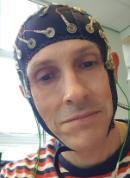Sleep and Circadian Rhythm Members
Researchers involved in this hub: (please note this is a work in progress)
Lukasz Chrobok
I obtained my PhD from the Jagiellonian University in Krakow in 2017. Following a period of postdocing at the University of Manchester, then back in Krakow, and then again in the UK at the University in Exeter, I ended up in Bristol in 2022. Currently, I am a Sir Henry Wellcome Fellow and a freshly baked Lecturer in Neuroscience in the School of Physiology, Pharmacology and Neuroscience. My research interests revolve around circadian timekeeping mechanisms outside the primary clock in the hypothalamus. My most recent work focuses on the circadian rhythms in the brainstem satiety centre, time-restricted eating, and circadian strategies to tackle obesity.
- A novel developmental critical period of orexinergic signalling in the primary visual thalamus. Sanetra AM, Jeczmien-Lazur JS, Pradel K, Klich J, Palus-Chramiec K, Janik ME, Bajkacz S, Izowit G, Nathan C, Piggins HD, Delogu A, Belle MDC,* Lewandowski MH,* Chrobok L* iScience (2024)
- Ticking and talking in the brainstem satiety centre: Circadian timekeeping and interactions in the diet-sensitive clock of the dorsal vagal complex. Chrobok L*, Ahern J, Piggins HD* Frontiers in Physiology (2022) 13: 931167 (review)
- Daily changes in neuronal activities of the dorsal motor nucleus of the vagus under standard and high-fat diet. Chrobok L* et al. Journal of Physiology (2022) 600(4): 733-749
- Daily coordination of orexinergic gating in the rat superior colliculus-Implications for intrinsic clock activities in the visual system. Chrobok L et al. The FASEB Journal (2021) 35(10): e21930
- Timekeeping in the hindbrain: a multi-oscillatory circadian centre in the mouse dorsal vagal complex. Chrobok L et al. Communications Biology (2020) 3: 225
- X: @ChrobokLukasz
- ORCID: 0000-0002-0118-2833
- ResearchGate: Lukasz Chrobok (researchgate.net)

Charlotte Crisp (nee Horne)
I am a Senior Research Associate based across the School of Psychological Sciences and Bristol Medical School with Prof Ian Penton-Voak and Dr Helen Bould. I am a member of TARG and funded by the Bristol Biomedical Research Centre. I am a cognitive neuroscientist with interests in how cognition changes with mental health conditions (particularly depression and psychosis) and how this might relate to chronotype, sleep and circadian rhythm disruption in human participants. More broadly, I work on projects investigating cognitive biases in depression and in relation to body dissatisfaction and have experience conducting studies with patient populations and using fMRI and eye-tracking methods. Please note that I have published both under the names ‘Horne’ and ‘Crisp’
- Crisp CM et al. (2024). Chronotype and emotion processing: a pilot study testing timing of online Cognitive Bias Modification training. BMJ: Mental Health.
- Horne CM & Norbury R (2018). Late chronotype is associated with enhanced amygdala reactivity and reduced fronto-limbic functional connectivity to fearful versus happy facial expressions. NeuroImage, 171, 355–363.
- Horne CM et al. (2017). Negative emotional biases in late chronotypes. Biological Rhythm Research, 48(1), 151-155.
- Crisp CM et al. (2024). Deterioration in cognitive control related mPFC function underlying development of treatment resistance in early psychosis. Scientific Reports.
- Horne CM et al. (2021). Cognitive control network connectivity differentially disrupted in treatment resistant schizophrenia. NeuroImage: Clinical. 30, 102631
X: @Horne_Char1234

Alice French
I have recently started in the School of Physiology, Pharmacology and Neuroscience as a Research Fellow and Proleptic Lecturer in Neuroscience. With this newfound freedom I am exploring the behaviour of sensory systems during sleep and how animals remain vigilant whilst unconscious. I am also interested by more fundamental questions like "Why do we sleep?". By studying the effects of sleep deprivation on physiology and cognition in different species, I hope to understand the functions of sleep and whether these are ubiquitous across the animal kingdom.

James Hodge
I am a Professor in the School of Physiology, Pharmacology and Neuroscience. We study how neural circuit activity underlies circadian rhythms, sleep and memory using Drosophila, molecular genetics, electrophysiology, optogenetics and computational neuroscience. We are interested in the fundamental biology of these behaviours and how they evolved. We are also interested in how circadian rhythms, sleep and memory are affected by ageing, drugs and diseases including Alzheimer’s, Parkinson’s, Down’s, schizophrenia, neuropathies and epilepsy (using human brain tissue). We collaborate with clinicians and Industry to study these diseases and test novel drugs. Related to food security we study the effect of neonicotinoid insecticides on fly and bee circadian rhythms and sleep.

Matt Jones
I’m a translational neuroscientist using sleep neurophysiology as a lens through which to illuminate mechanisms of neural circuit development and (dys)function in health and disease. Our team includes networks of collaborators across academia and industry and uses in vivo recordings of network activity in mice, rats and people, often alongside psychopharmacology and computational modelling. We’re particularly excited about our Wellcome-funded ‘Sleep Detectives’ project, through which we’re developing a toolkit for longitudinal monitoring of sleep and cognition in children and young people.

Stephen Montgomery
I’m an Associate Professor in the School of Biological Sciences. I’m interested in the evolution of learning and memory, and how cognitive evolution might be accompanied by changes in the mechanisms underpinning memory consolidation, for example during sleep.

Hugh Piggins
As an undergraduate at the University of Edinburgh, I was fortunate to be introduced to the fascinating world of biological rhythms by two excellent lecturers, Bambos Kyriacou and David Saunders. Subsequent to my PhD on developmental actions of neuropeptides (Ottawa, Canada), I had two very enjoyable and rewarding stints working in circadian neuroscience as a postdoctoral research associate in Canada with Profs Ben Rusak and Kazue Semba (McMaster and Dalhousie Universities). I started my independent lab in King’s College London in 1996 and moved to the University of Manchester in 1998. I took up the role of Head of School in Bristol in 2019. My research has examined a broad range of questions in chronobiology including: the role of intra- and extracellular signaling in the suprachiasmatic nuclei (SCN) (Coogan et al., 2003; Brown et a., 2005), the ionic basis of neuronal rhythms in the SCN (Belle et al., 2009; Wegner et al., 2018), the impact of neurodevelopmental disorders on circadian rhythms (Timothy et al., 2018), actions of scheduled physical exercise on molecular and cellular timekeeping (Hughes et al., 2021; Hitrec et al., 2023), and the spatiotemporal organisation of extra-SCN brain oscillators (Chrobok et al., 2020; Ahern et al., 2023).
- Coogan et al., (2003) DOI: 10.1523/JNEUROSCI.23-07-03085.2003.
- Brown et al., (2005) DOI: 10.1523/JNEUROSCI.3821-05.2005.
- Belle et al., (2009) DOI: 10.1126/science.1169657.
- Wegner et al., (2017) DOI: 10.1523/JNEUROSCI.0691-17.2017.
- Timothy et al., (2018) DOI: 10.1016/j.biopsych.2017.04.018.
- Chrobok et al., (2020) DOI: 10.1038/s41598-023-32315-y.
- Hughes et al., (2021) DOI: 10.1038/s42003-021-02239-2.
- Hitrec et al., (2023) DOI: 10.1016/j.isci.2023.106002.
- Ahern et al., (2023) DOI: 10.1038/s41598-023-32315-y

Ross Purple
My research focuses on the interplay between sleep, memory, and mental health using a range of techniques in both rodents and humans. In 2013 I began my DPhil within the Sleep and Circadian Neuroscience Institute at the University of Oxford where I researched sleep and circadian rhythms in individuals at high risk for developing psychosis. In 2017 I joined the University of Bristol studying emotional memory processing during sleep using in-vivo electrophysiology. I am now an MRC CDA Research Fellow investigating the role of sleep in processing traumatic experiences, and how sleep could be utilized as a therapeutic target to prevent the development of PTSD.
Rebecca Richmond
I am a Senior Research Fellow in Molecular Epidemiology. I work within the MRC Integrative Epidemiology Unit (IEU) in the Bristol Medical School and lead a research theme on "Sleep and Physical Activity" within the CRUK Integrative Cancer Epidemiology Programme (ICEP). I am currently undertaking a secondment at the University of Oxford, working within the "Better Sleep" theme of the NIHR Oxford Health Biomedical Research Centre. My research focuses on the assessment of self-reported and objectively-assessed sleep measures in large scale population-based studies and their integration with genetic, molecular, behavioural and biomedical data to improve our understanding of the role of sleep and circadian disruption in chronic disease risk.
My X handle is: @beckyrichmond90

